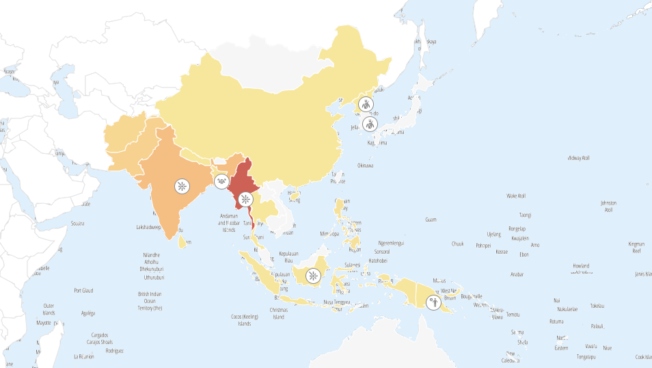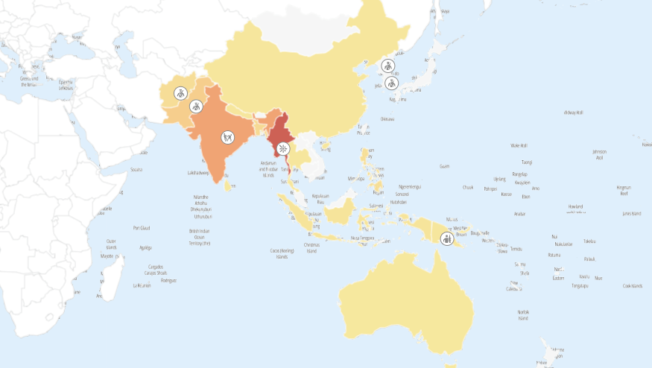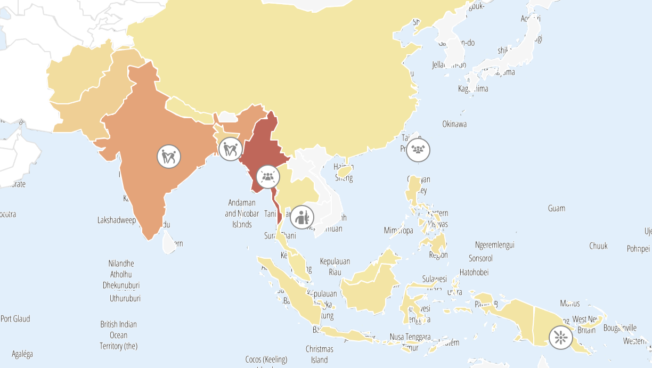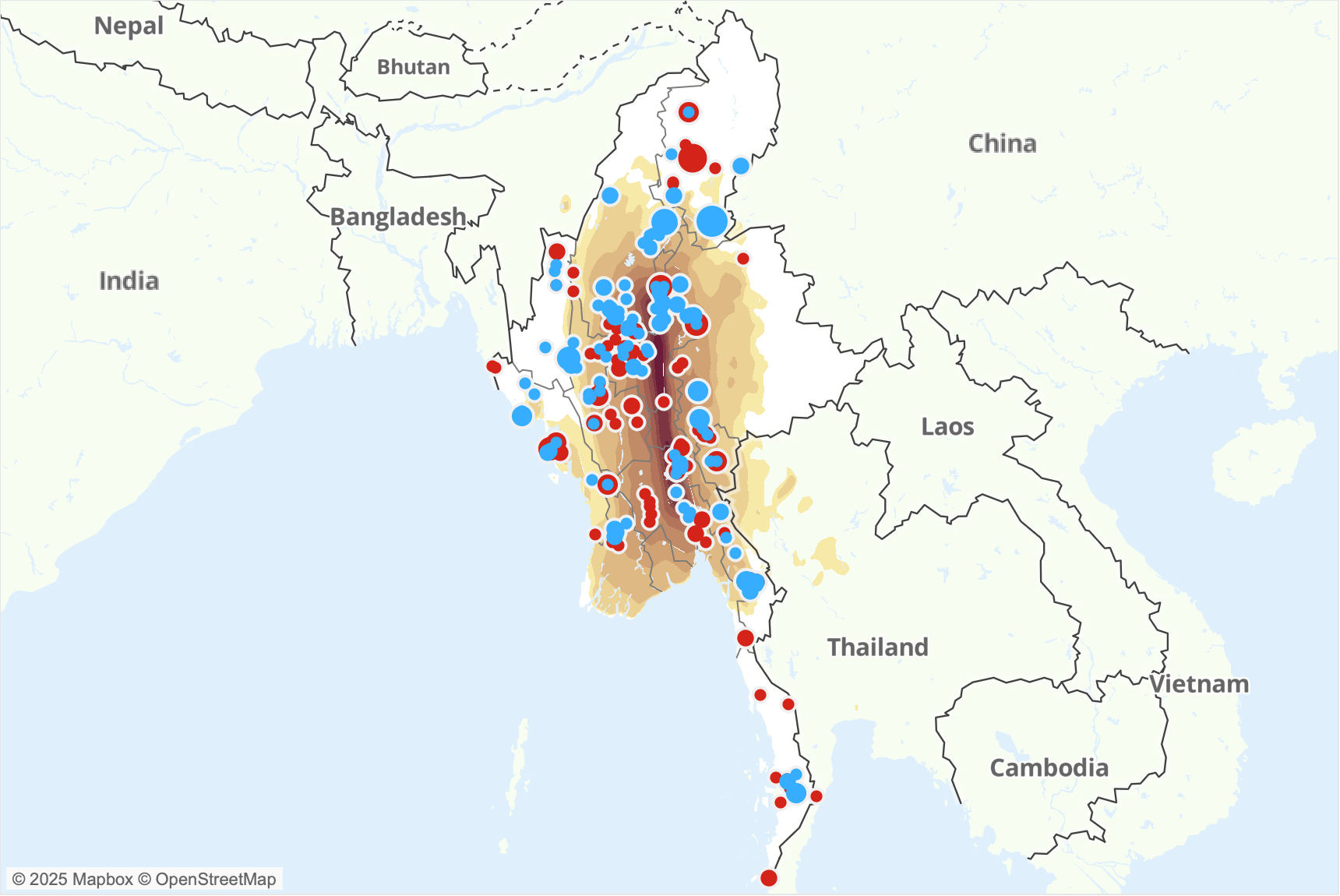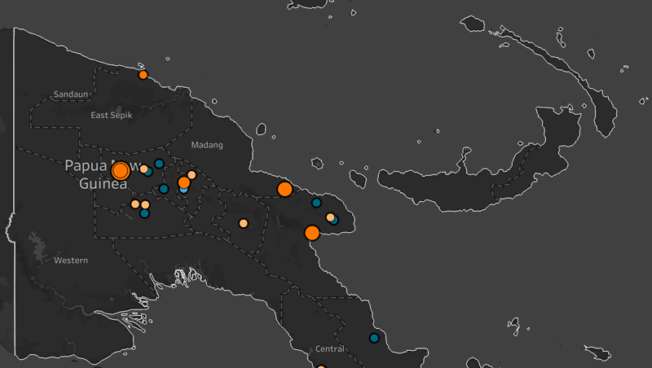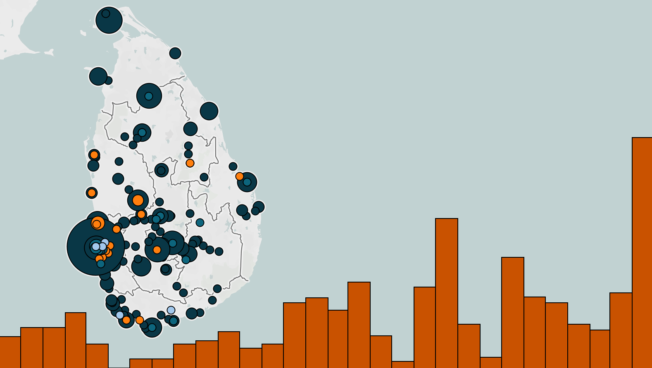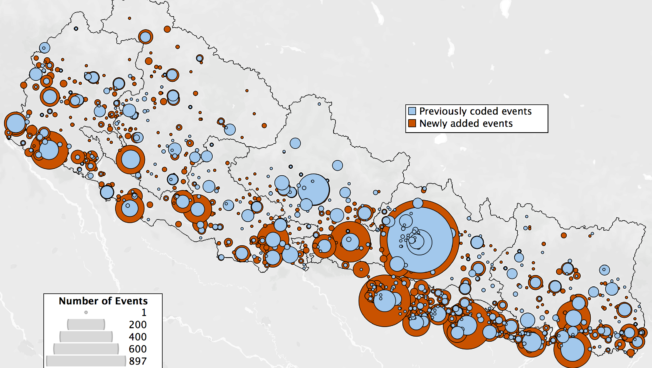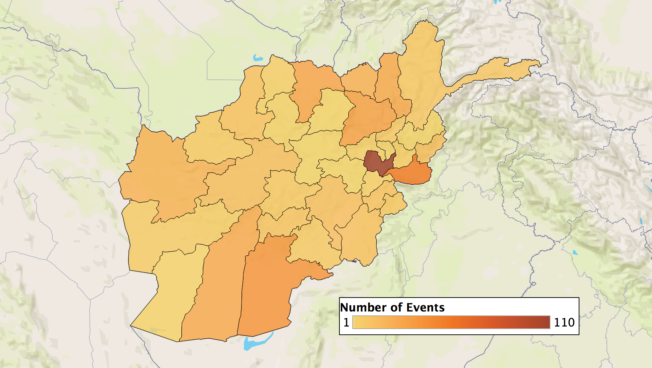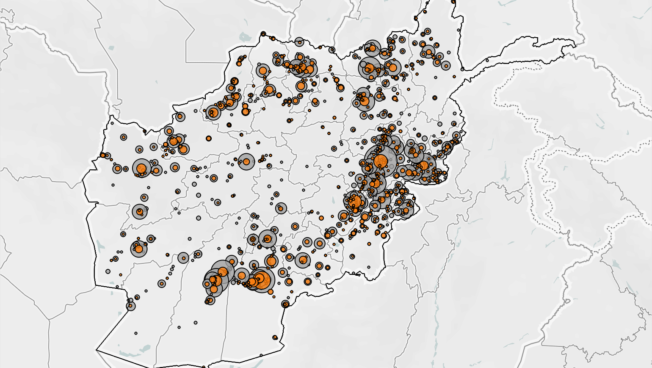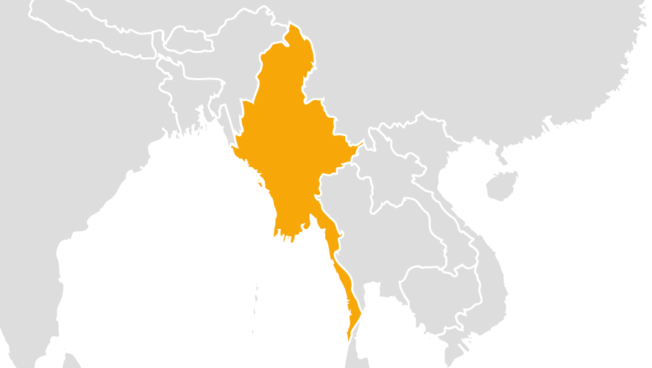Find all ACLED data and analysis for Asia-Pacific below.
The Asia-Pacific dataset is updated every Tuesday through the most recent Friday.
Curated Data
This file contains all political violence events, demonstration events, and strategic developments recorded in Asia-Pacific from the beginning of ACLED coverage to the present. Please note that historical coverage may vary by country. A full list of country-year coverage is available here.
For an explanation of how ACLED codes and categorizes data, see the ACLED Codebook. For more information, see our Resource Library. Guides specific to Asia-Pacific include:
- Methodology and Coding Decisions for Political Violence and Demonstrations in Afghanistan
- Methodology and Coding Decisions for Political Violence and Demonstrations in China
- Methodology and Coding Decisions for Political Violence and Demonstrations in Myanmar
- Methodology and Coding Decisions for Political Violence and Demonstrations in North Korea
- Methodology and Coding Decisions for the Philippines Drug War
Asia-Pacific ( 09 May 2025 )
Regional Overviews
Our monthly analysis briefs break down the latest data on political violence and protest trends, highlighting potential early warning signs for closer monitoring.
Asia-Pacific Analysis
Q&A | 24 April 2025
Q&A: Will the ceasefires after the earthquake bring peace to Myanmar?
The parallel National Unity Government (NUG), some ethnic armed groups, and the military have declared unilateral ceasefires, but violence persists. ACLED’s Asia-Pacific Senior Analyst Su Mon Thant explains why these ceasefires are unlikely to result in peace.
Regional Data Collection Partners
ACLED partners with a wide range of organizations to collect information in hard-to-access contexts and integrate thematic, regional, and country-level expertise into our data collection program. Click through the list to learn more about our partners in the Asia-Pacific region.
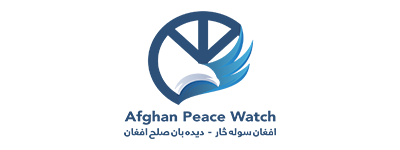
Afghan Peace Watch (APW)

Afghan Peace Watch (APW)
Afghan Peace Watch (APW) is a non-profit organization focused on delivering credible information and research on security, political violence, civic activism, human rights violations, humanitarian efforts, and strategic developments in Afghanistan. APW enhances access to credible information in Afghanistan and promotes peace through conflict resolution, media reporting, research, advocacy, accountability, and humanitarian support. The organization has been documenting security and violence incidents in Afghanistan since February 2020. Following the Taliban’s takeover in August 2021, media and research organizations face strict censorship, making access to accurate information extremely difficult. To collect credible data from the ground in Afghanistan, APW uses a unique methodology, maintains a network of reporters all across the country, and draws information from around 238 sources in all 34 provinces.
Coverage: Afghanistan

Afghanistan Analysts Network (AAN)

Afghanistan Analysts Network (AAN)
The Afghanistan Analysts Network (AAN) is a non-profit, independent policy research organization. It aims to bring together the knowledge and experience of a large number of experts to inform policy and increase the understanding of Afghan realities. The institutional structure of AAN includes a team of analysts and a network of regular contributors with expertise in the fields of Afghan politics, governance, rule of law, and security. AAN will publish regular in-depth thematic reports, policy briefings, and comments.
Coverage: Afghanistan
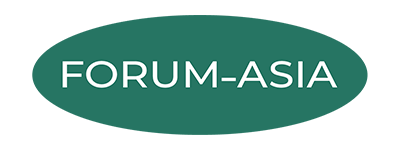
Asian Forum for Human Rights and Development (FORUM-ASIA)

Asian Forum for Human Rights and Development (FORUM-ASIA)
The Asian Forum for Human Rights and Development (FORUM-ASIA) is a network of 85 member organisations across 23 countries, mainly in Asia. Founded in 1991, FORUM ASIA works to strengthen movements for human rights and sustainable development through research, advocacy, capacity development and solidarity actions in Asia and beyond. It has consultative status with the United Nations Economic and Social Council, and consultative relationship with the ASEAN Intergovernmental Commission on Human Rights. The FORUM-ASIA Secretariat is based in Bangkok, with offices in Jakarta, Geneva and Kathmandu.
Coverage: Regional
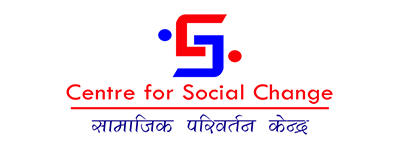
Centre for Social Change (CSC)

Centre for Social Change (CSC)
Founded in 2015, Centre for Social Change (CSC) is a non-profit making social think-tank based in Kathmandu, Nepal working on the changing socio-political dynamics of Nepalese society via research, education, and policy advocacy. CSC’s current works are focused on issues around conflict prevention, governance, migration, labor, civic engagement, and social development.
Coverage: Nepal
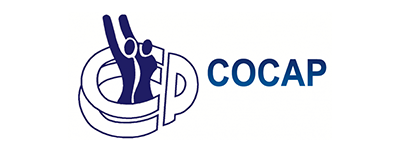
Collective Campaign for Peace (COCAP)

Collective Campaign for Peace (COCAP)
Collective Campaign for Peace (COCAP) is a national network of 43 peace and human rights non-governmental organizations from 29 different districts of Nepal. It aims to provide a common space for its members, volunteers and friends to collectively engage in the pursuit for peace, human rights and justice in Nepal. It organizes national/regional level campaigns and conferences on the issues of peace and human rights in coordination with its member organizations and other like-minded organizations. In November 2014, COCAP started a new conflict prevention and protection initiative, NepalMonitor.org. The initiative is based on an online system designed to alert local organizations about human rights and security incidents in their area.
Coverage: Nepal
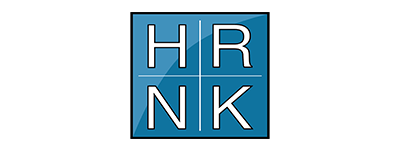
Committee for Human Rights in North Korea (HRNK)

Committee for Human Rights in North Korea (HRNK)
Established in 2001, HRNK is America’s only think-tank focused exclusively on researching, investigating, and publishing on the North Korean human rights situation. Through satellite imagery analysis, escapee testimony, interviews with experts in the field and desk research, HRNK has produced 52 major reports on the North Korean human rights situation. HRNK has held UN consultative status since April 2018. Nine HRNK reports were quoted 27 times in the 2020 U.S. Department of State Report on Human Rights Practices in North Korea, released on March 30, 2021.
Coverage: North Korea
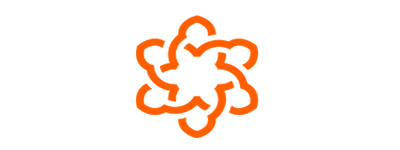
Deep South Watch

Deep South Watch
Deep South Watch (DSW) is an autonomous organization seeking to create a common space in the deep south provinces of Thailand for parties in the conflict to engage in peace discourses. Deep South Watch seeks to provide an opportunity for stakeholders to find an exit from the violent conflict. Based on the research project, in 2004 DSW has produced the Deep South Watch Database, which uses media as well as official records to track violence and conflict incidents in the southern border provinces of Thailand. Deep South Watch (DSW) is also affiliated to the Center for Conflict Studies and Cultural Diversity (CSCD) of Prince of Songkla University at Pattani, Thailand.
Coverage: Thailand
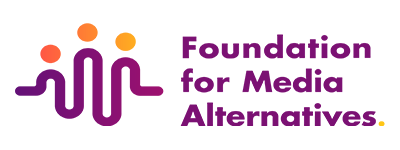
Foundation for Media Alternatives (FMA)

Foundation for Media Alternatives (FMA)
Founded in 1987, the Foundation for Media Alternatives (FMA) assists citizens and communities, especially civil society organizations (CSOs) and other disadvantaged sectors, in the strategic and appropriate use of information and communications technologies (ICTs) for democratization and popular empowerment.
Coverage: Philippines
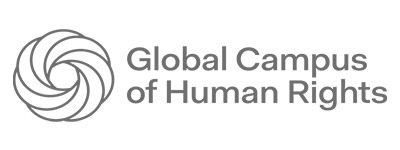
Global Campus of Human Rights - Human Rights Centre of the National University of Timor-Leste (HRC-UNTL)

Global Campus of Human Rights - Human Rights Centre of the National University of Timor-Leste (HRC-UNTL)
The Global Campus of Human Rights (GC) is the world’s largest network of universities teaching democracy and human rights, with over 100 members in all continents. The GC is organized in seven Regional Hubs with seven Master Programmes located in Venice for Europe, in Sarajevo/Bologna for Southeast Europe, in Yerevan for the Caucasus, in Pretoria for Africa, in Buenos Aires for Latin America and the Caribbean, in Beirut for the Arab world, and in Bangkok for Asia-Pacific. The GC is funded by the European Union as a priority action of its Instrument fo Democracy and Human Rights. Since 2019 the GC has been assisting the National University of Timer-Leste in the development of human rights education and the setting up of its Human Rights Centre (HRC-UNTL) with support of the EU. The goal of this new local institution is to contribute to the promotion and protection of human rights, democracy, and development by providing training, international networking and research activities.
Coverage: Timor-Leste
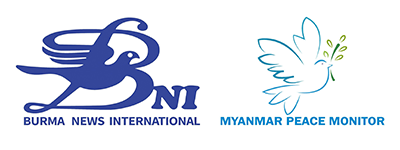
Myanmar Peace Monitor (MPM)

Myanmar Peace Monitor (MPM)
Myanmar Peace Monitor (MPM) is a program run by Burma News International (BNI). BNI is a long-standing local/ethnic media network comprised of 15 member media outlets covering ethnic nationalities and minority perspectives. The MPM monitors and systematically documents Human Rights Violations, War Crimes, Crimes Against Humanity, and Peace and Conflict Situations, exposes accurate and reliable information, and becomes a reliable data source for the people of Myanmar and regional and international key actors for conflict transformation. In addition to the daily news and interviews published on their website and Facebook, the MPM also publishes Bi-Monthly News Reviews, Monthly Peace and Conflict Dashboards, Special Analysis Reports, and an Annual Peace Reference Book or a guide to explore Myanmar Peace Building, Conflict Transformation, and Federal Democracy Building.
Coverage: Myanmar
Show more (5)

